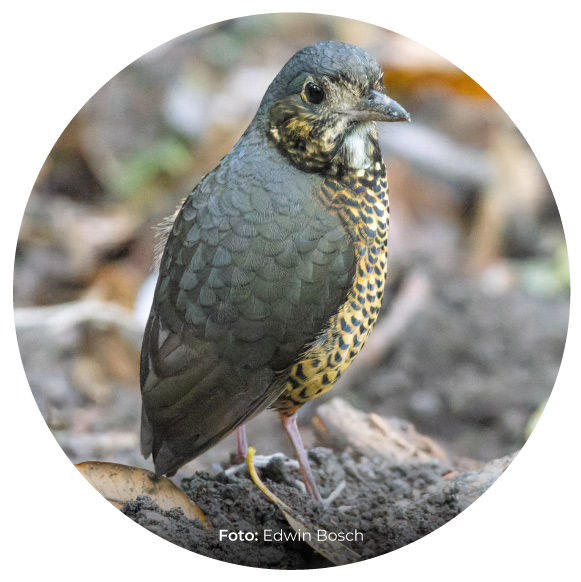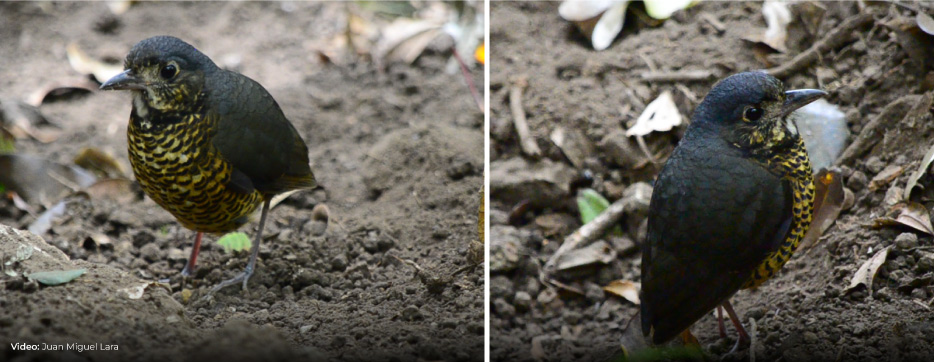Fundación ProAves team member Nemesio Andres Gulfo discovered a mysterious huge antpitta – a thrush-like bird with powerful legs and appears tailless – that was feeding on the ground close to the El Dorado ProAves Reserve eco-lodge.
ProAves ornithologists rushed to the El Dorado reserve and worked with Nemesio to identify the species. At first it appeared to be similar to the Undulated Antpitta Grallaria squamigera – a species found across the main Andean cordilleras of Colombia. However, after intensive observations, song tape recordings and finally the capture, measurement and release of an adult bird, the ProAves research team was able to confirm that Nemesio’s discovery represented a unique and distinctive new species of Antpitta for science!
In fact, the species may be closely related to the geographically closer Great Antpitta Grallaria excelsa known only from the Merida mountains of Venezuela, which is likewise a subtropical forest specialist, but over 400 km distant. The new isolated species in the El Dorado reserve has a distinct gray head contrasting with an olivaceous back and wings. But its facial characteristics are particularly strong with a bright white “beard” and black collar. The vocalizations are especially interesting as they are very similar to another species in the reserve, meaning this shy species has been almost completely overlooked by the countless birdwatchers and ornithologists visiting El Dorado ProAves Reserve since 2005.
While more evidence is being documented, such as its distinctive ecological traits, measurements and vocalizations, the team are provisionally referring to the new species as the “El Dorado Antpitta”. The research team composed of Nemesio Andres Gulfo, Alex Cortes, Juan Carlos Luna, Paul Salaman and Thomas Donegan aim to publish all the evidence in the coming year in collaboration with the University of Antioquia who are undertaking phylogenetic studies using blood taken from a captured individual – that was released unharmed after study.
Approximately 10,000 ornithologists and birdwatchers have visited the El Dorado ProAves Reserve and surrounding area in the past two decades and never seen or heard the species. There was one sighting of a bird for five minutes in 2015 by Sophie Osborn and Chad Olson, but only a distant blurred photograph was taken and which they considered to be of Undulated Antpitta.
Even more astounding is that the new species occurs in the former property called Vista Nieves of one of South America’s most famous bird collectors, Melbourne Carriker. He and his family lived in the early 20th century and collected thousands of birds, but bizarrely never this species.
It is very rare to find a new species of bird nowadays. Just three new species were described globally in 2023. Colombia is the world’s #1 country for birds with over 1,979 bird species recorded and yet new species can still be found there – the last bird described in the country was the Chami Antpitta in 2020.
This exciting new discovery further highlights the global importance of the 1,300 hectare El Dorado ProAves Reserve for biodiversity conservation thanks to Fundacion ProAves. It already protects over 20 endemic bird species and hundreds of other species of amphibians, orchids, reptiles and much more restricted to the subtropical and montane forests of the reserve and Sierra Nevada de Santa Marta.
Tragically, deforestation is accelerating in the cooler subtropical forests around the El Dorado ProAves Reserve and the Sierra Nevada because of a property boom to escape the increasing hot and dry coastal plain and city of Santa Marta attributed to climate change. This is pushing housing into the mountains where land prices have sky-rocketed and as a consequence unprotected subtropical forests in the region are being sold and cleared (often without authorization) to make way for holiday homes and new farms.
This remarkable discovery of El Dorado Antpitta should be a moment of triumph for Colombia, however, it is worrying as the species is so endangered and its populations appear to be too small, which we fear for its future survival.




